I enjoy the 150 photos posted on EastSouthWestNorth. They are about real China. I don’t know whether the original source of the photos. I assume it is the web site, and credit goes to EastSouthWestNorth. I am re-posting some of the photos from the site, with my comments. I only pick those I personal feel very familiar to me, and add my observation to it. I hope the effort will help people who don’t know China to see the other side of the country, instead of just a country related to "Human Rights", "Tibet"… (I admit my own ignorance that only after I really took time to study what happened in Darfur did I understand Darfur is actually in Africa. I guess China may be the same for many people, who cannot really point out where China is on a map).
About the Photos
These photos are quoted from the web site EastSouthWestNoth. I don’t know the photographer, so I cannot gave credit, but the photos are very good and reflect real China very well. If anyone know who is the photographer, please let me know, and I do want to give big credit to him/her/them.
About My Selection
There are many photos in the original site. Most of the scenes look very familiar to me because I saw it all the time in the last 20 years. But I will only choose those scenarios I have personally experienced. I just don’t have camera at that time, and I don’t have the skill to capture the scene, but they did exist in my memory.
Also, most of the photos seems to be taken in 1990s in China. It is not current China. For current China, hopefully my site helps – I have many photos! Here come the Photos.
Getting on to Train
Below: too many people to get on to a train. This is exactly my initial memory of a train. I also entered a train via window! My memory is even worse than this photo. My home town is Henan, the province with biggest population, and there are just very few trains at that time. It is basically a war for everyone – people inside are fighting very hard to close window, to avoid people crawling in (thus make it even more packed), and people outside are "attacking" the window. If there is one open window, it is just like a hole in a dam – many people will get in and there is no way to close the window before the train moves – after train moving, there will still be people in the middle of the window! To be short, my memory of train is even worse than this image. Look, there are still open window there at least. Imagine what it looks inside. Bathroom is full of people, and no one can manage to move. People are everywhere – on the top at the luggage rack, on the floor under each bench, sitting on top of the back of the seat, or just manage to keep balance on the table. It is not news if someone manage to take 10 hours of train ride with only one foot on the ground. This was my experience back in 1990s. If there were color on the photo, you will see the train is green.
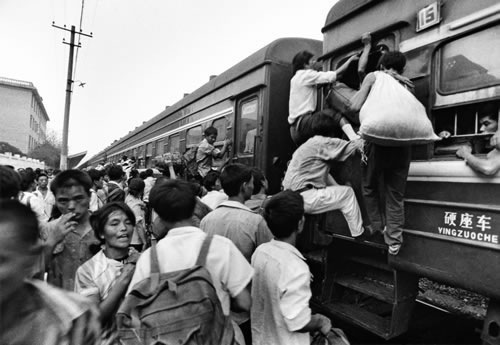
Now the trains are replaced with CRH trains (with photo), and this scene is very rare in China now (I don’t think it has completely gone away, since during Spring Festival, in some section, this scene may also on show). If you ask me, I am pretty happy with the change, and talking about human right? I stand firmly that we need more freedom in speech, and political rights, but the right to enter a train from door is also part of human right, and I HAVE TO give credit to people who made it happen. (Of cause, we need to reflect as a nation about who pulled the rich country in the past into the bottom of poverty and chaos).
45 Minutes Line for WC
According to the original title of this photo, the train station is full of people going down south to work, so that the bathroom line is longer than 45 minutes. I don’t experience that long line myself, since the line for men’s room is always shorter than the women, but I do experience situation when there is no WC at all. In my life (in early 1990), it is not something shy to piss at the side of the road. In the village I was born (photos), water closet is just some new, and it didn’t exist when I left the village when I was 5 year old. There is a well in the village, and all water comes from the well. Restroom by definition, don’t have water in it.
For my mother’s hometown, they don’t have water at all, and they have to go very long way to get very limited water. A bowl of water can be reused for many days before drop it away. This was the real situation when I was born. Until today, my mother has the habit to save every drop of water. Now they can use pure water.

This is true during my trip just 4 years ago, in a tourist group to Daocheng, the Tibetan area. The first lesson the tour guide, a lady taught us was how to "sing" in the Tibet area. By "Singing", she means to go to WC. When tour bus stops, men and women get off the bus and find his/her own places. General rule is, women find further places, and men just do it near the bus. I believe it is the same today.
Again, I do love more human rights in China. When I have a house, and have good job, and I want more. I want my void heard. But I am also aware that human right mean a place to piss in private with dignity. I see the change in the last 20 years as a history of improved human right record in China.
Money
This is the Instant lottery ticket purchase line some where in China. I have experienced something similar – not so many people, but pretty close.

To get rich is not easy, especially in early days of China. People have enough time and ambitious enough dream to get rich. How to do it? Lottery seems the only way that everyone can participate. I was one of the person who bought lottery back in Luoyang, and dreaming to get something big. I did won a soap or two with many many tries when I was young. In Shanghai, recent years, there are still lottery like this (see the first photo, taken in 2003), but it is not the only way to get rich today. Something to note is, at that time when the photo above was taken, the job market is not open yet, and people don’t have the right to choose a job yet, and just recovered from the thinking "Money is the worst thing in the world".
I have two observation. It is the crazy idea of communist to turn people into extreme poverty, and we don’t have enough reflection on it yet. However, in the economic field, China government did something right in the last 30 years.
Below: Roadside vendor selling to railroad passengers. I saw this and it happens in some section of China these days. I don’t buy from them but many people buy – I think it is good for local economy. Long the railroad, in tourism area, in many middle and west part of China, vendors like them are everywhere. We experienced the same thing in Cambodia – a sign of poverty. I do have great respect to them, although many people
got annoyed by them. I read many foreign visitors to China wrote about the unpleasant experience to be surrounded, or traced by the local vendors, and they refused their offer pretty rudely, and even think they "don’t understand how to be polite". Well. I can be polite if I have something to eat, and have something to raise my children. It does not mean anything to be polite if I am starving.

I am writing a blog about Shanghai, since I am living in this amazing city in China. However, Shanghai’s situation does not represent China at all. The image I showed is more like China. However, take into consideration that these photos are taken about 10 years ago (I don’t know when they were taken exactly though), and things changes faster than everyone’s imagination.
I hope they can get a better life first – to be able to get some money to improve their lives. Democratic is important, I believe. I hope they can find a way to manage their village better, both politically, and (more importantly) economically.
I saw someone criticizing that people in China take economic progress too seriously. Well. If I were the railway vendors, I do take it more serious than "environment", "human rights", "freedom" that many people care. I hope one day, they care about these human rights, but only after they have a better economic right. (Meanwhile, I believe democratic in some sense help economic growth).
Haircut and Food
I love this photo: Street barber in a demolished room. I don’t see it in Shanghai these days (in the recent few years), but it is how people have their hair cut before. I didn’t personally experienced it, since when I was young, I went to barber shop in a room, not on the street. But I do see many older people at the same time (1990s) choose to have their haircut on the street. A room is too fancy for simple job like haircut.
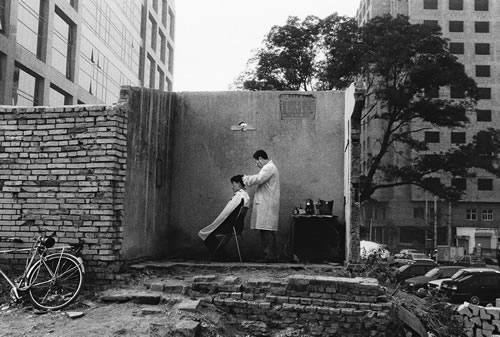
I am pretty familiar with this, and I was a loyal customer of these out-of-school youth selling cooked yam on the street. In my hometown, they typically sell baked potato, not yam. There are many of them. On the street, there are many shops until recently. When I came to Shanghai, I heard the news that in this city, shops offering eat on the pedestrian road is not allowed, I thought: "It is crazy! Is there any restaurant selling small things like this can afford to rent a room?" Later, I know that is the difference between a rich city like Shanghai and a poorer city like Luoyang (Luoyang is not a poor city in any way, so imagine China).

I believe even people who haven’t come to China may heard of some terrible story about the hygiene status of China. Many of my foreign friends are very cautious in China regarding food – they can easily got sick after eating something we eat everyday. Well. I admit it is true. However, the point is, to have clearer food is a human right, isn’t it? Everyone wants that right, but for 1.3 billion people to have this right is not very easy. I am in Shanghai, and I don’t eat those "tasty" food any more, but I know when one day, the food get clearer in my hometown and in most other places in China, we are improving human rights in China. I hope everyone can do something positively to improve the human right record.
Law
Below: "The cadres visit the village to explain the law, and are treated to a work meal of potatoes".
From the mud wall, I guess it should be somewhere in the middle of China, where my hometown is. Now to mention the farmers in villages, even people in Shanghai like myself don’t have a clear law concept. I can tell you that I have never been to the court in my life yet: never got sued, and never sued anyone. Law is something new to many people. The change from empire ruled country in Europe took many decades, and American were lucky enough that they don’t have that kind of history when the nation was formed. China is different. In previous entries, many people use the word of "brainwash" to describe the behavior of Chinese people. I agree that some of the blind-nationalism and put an equal sign between party and the country is due to propaganda and brainwash, but many other things are rooted far more than the recent 100 years. It is rooted in the long history of China. If you call it "brainwash", just call it, since in some sense, culture can be regarded as "brainwash" in long enough years, so the group of people have pretty unique way of thinking. The thinking logic is pretty common among one group of people but distinctly different from another group of people. We call it historical and cultural different, right?
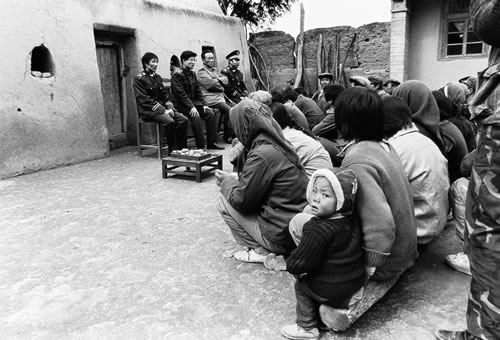
Population
Below: A peasant woman and her ten children.
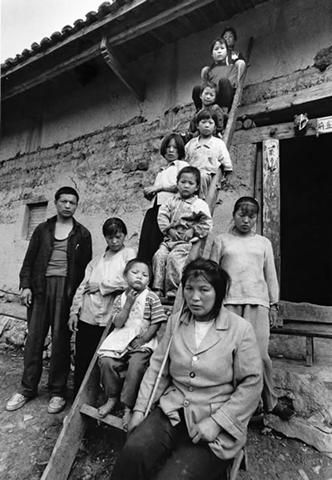
People in China love to have more children. People in China love to have boys. Please wait to point fingers to the peasant woman on the photo and judge what she did with your value system.
For a peasant family, number of children is almost equally to the production power of the family and hence the economic return of the family unite. For a highly urbanized Europe or North America, and especially after the industrial revolution, people just need a job to survive. In the vast rural area of China, a family is almost can be called a company (I know it is inappropriate, but you can loosely think that way), and number of children can also be thought as number of employees. The more employees you have, the stronger the family are. (For my friends in China, I know it is not EXACTLY the real situation, but I think it is pretty easier for people interested in China to think that way. For my readers, please don’t get mislead by my comparison, if you have a chance to learn more about how rural areas in China works.
The other reason is the thousands of years of family value in China. As I stated in article The Name of Chinese People, I am the 20th generation in my family tree, and my family book have detailed record of every single person in the family tree since the year of 1380 – my son Yifan, me, my father, his father, and 19 generations before him. The traditional way to record it is just to use male in the family, and female didn’t appear in the book. The family book has been past down for 500 years (in my family), and there are efforts from the family to find out the book before the year of 1380 (For your information, our family migrated from another province in that year). Many other family has more than 1000 years of record. Imagine the proud and the family value! Also imagine what if you don’t have a boy to keep the book going, and your branch in the book ends at you. This explains why people in China love boys.
Recent 50 years changed it. People don’t take family book as serious as before, and I don’t know whether we should be happy or unhappy about it, whether as a nation, we are lucky to abandon it, so we don’t have the pressure to have boys, or we are unlucky to be the generation to stop the tradition that has survived in so many years.
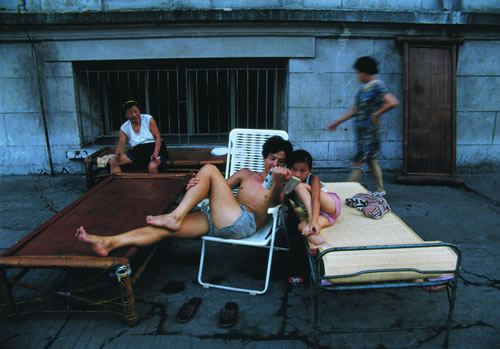
This is
common scene in my hometown, Luoyang. In summer, people get to street, and cool down for heat. People have different definition of privacy and public image. If it is accepted by local, what’s the point to say it is uncivilized (as I saw many comments from blogs and travelogue by foreigners?)
Below: The commune wash room in an apartment building.
I love this picture a lot since I lived in this environment for two years since I was 4 years old, until maybe 6. If someone had a camera, they may caught me like the little child in this picture.
![image3[1]](http://home.wangjianshuo.com/archives/2008/f807dcd8573b_12659/image31.png)
That is the living standard of many Chinese in 1980s.
Relationships between people are pretty different than the current relationship in China (change in China), and also very different from the families in U.S. today.
P.S. Disclaimer
As a routine, whenever I post something related to the topic of China, I have to put a disclaimer here: Please first read a story called Blind Men and the Elephant and understand everyone is a blind man who can only possibly see part of world, and we have to accept the truth is, the same thing will definitely appear to be different to different people, and we also need to accept the really that there are many different but all correct answers to the same question.
China is so big a topic, and it means the people, the government, the land, the culture, the history and many things, and it has bright side as well as dark side; it has its hope and desperation; it is mixed of the best and the worst. In any article, I can either focus on something good, or bad, but hardly can be both. Whenever I post bright side of China and express my hope to my country, there are enough comments pointing out that I ignored the bad side. What comments are exactly the truth! When I write the dark side of this country, and show my worry, there are almost the same amount of comments pointing my finger about my limited knowledge about the whole China (or the elephant in my story). These comments, again, are very correct, since no one in this world is in a position to tell people what China really is, just like the blind men in the story.
My experience – where I was born, how I am raised, cities and villages I have lived in, and how I am treated by people around me, my job, my education, my luckiness or unluckiness, my love or hate, my hope or desperation – are only mine. If you think differently, it is the best time to share what you see China, from your perspective. Please do so now and that is why we have comment function on this blog. ( YLF )
While you are right about the CRH trains being more comfortable and civil than shown above, how many migrant workers and farmers can afford to take the CRH train? In reality most cannot afford the high price of the D trains and millions of ordinary Chinese still take those disgusting green trains that date back from the 80s and 90s. I was on one a few weeks ago, not by choice but because there were no other options out of the small town I was in. Be careful not to portray ALL trains in China to look like the CRH just because you happen to be in Shanghai that gets special treatment from the railway authority.
The blogger has finally shown his true colors through his recent series of patriotic propaganda articles.
Why didn’t he mention the recent terror launched by those patriotic mosters against a Chinese female student in Duke University who leans more towards pro-Tibet movement? (The Chinese mobsters have published all her personal info on the web and she received all kinds of threat emails or phone calls. Now she is living under police protection. Even her family in China are living under the threat of terror now.) The following is just one of many youtube videos which tried to portray that poor girl as public enemy one in China:
http://www.youtube.com/watch?v=i5U6uTiXUxo
Why doesn’t he mention the death threat emails sent by those patriotic Chinese to a person who holds a different opinion?
http://billtieleman.blogspot.com/2008/04/death-threats-in-canada-show-what.html
Why doesn’t he mention that it is the routine procedure for Chinese government to “settle accounts after autumn” with its dissidents? First there is most wanted name list and massive arrests. Then there is large scale purge. Then there is mass education or brainwashing.
This so-called harmonious Olympics has already turned into an Olympic terror. I expect further “settling accounts” after Olympics.
shanghai-ren (you are so not),
To be fair, she so deserves this.
After watching how the Western free media reporting news, I just don’t believe what’s written in the article you linked to. I really don’t.
‘..routine procedure for Chinese government to “settle accounts after autumn”‘??? This shows how naiv and brain-washed people can be. Please remember, Culture revolution ended in 1976.
Please, only involved yourself and have an opinion on things that you really know and are capable of understanding.
Obviously, Tibet/China matter is not one of them.
To clarify, I believe that the photos originally appeared in 2004 at a biennial photography exposition in Guangzhou. These are the so-called award winners. Thereafter, the photos propagated through the Chinese Internet. But the photos were not properly credited. The photos were posted on ESWN following that same tradition, on the grounds that they had a huge impact back then in China and the western readers ought to have an opportunity to share that experience. I was moved by these photos because it showed a different China from the glossier side that is ordinarily presented to the western world. It is important to remember that economic development in the capitalist mode is often uneven and even unfair.
Wow the pictures are quite powerful. China is slowly (or quickly) improving as a nation. It just needs time.
i agree with tommy
donot and never involed yourself in things than you never has experience and capture from your own understand from getting through. they are more qualified than you who personally experience .
Sadly, Chinese mobsters have gone wild even in this discussion thread, which exposes and underscores the Beijing Olympic terror ravaging around the globe.
Now, go back to blogger’s topic. May I suggest the following real pictures of China in the distant past, recent past and present:
Revolutionary Red guards waved Chairman Mao’s Red Book, smashed anything of old, elitist, or foreign culture, and stomped on the backs of fellow citizens (1960s)
http://news.china.com/zh_cn/history/photos/11025921/20050818/12581994.html
So-called patriotic students turned violent and threw stones and bottles at USA Embassy in Beijing (1999)
http://news.sina.com.cn/world/review/index.shtml
Angry youths shouted slogans and attacked Japanese-owned shops in their anti-Janpanese Red terror (2005)
http://garbolino.blogspot.com/2005/04/anti-japanese-demonstration.html
Chinese mobsters of high education, low education or no education lynchpinned a poor Chinese girl for holding a different view (2008)
http://chronicle.com/news/article/4304/chinese-student-at-duke-u-hit-with-online-attacks-for-alleged-sympathy-for-tibet
Millions of presumably capitalism-benefited and globalization-embracing Chinese consumers turned xenophobic and picketed outside French retailer Carrefour (2008)
http://news.sohu.com/20080416/n256319124.shtml
Is China becoming more civilized? I doubt it. Same misanthropy, same xenophobia and same extremism.
@shanghai-ren… xenophobic is clearly not the appropriate descriptor. There are reasons behind everything (rightly or wrongly), but the Carrefour incident is clearly not due to a ‘fear’ of foreigners.
One of the most problematic issue for foreigners/ tourists in China is the standard of sanitation and quality of public toilet in China.
Two years ago when I was in Shanghai, I totally freaked out that people shit on the common area in the toilet… as in the area where you would Q to go into the cubicle… Some of the older toilets also do not have doors and people use umbrellas to “shield” themselves…. in the really really old ones, if you are lucky…you might even see drain-like sewage system so if the person in the next-door cubicle shit, you can see the stool “flowing” pass you….yucks…
I hope they have done away with all these disgusting toilets….
I only use the hotel toilets. Even the ones in shopping malls are terrible….. does anyone else here share my experiences? What do you do?
Thease pics are great!
shanghai-ren, why didn’t this blogger block your post from being posted on his site?
@ Wang, You are so lucky that your family book has been kept well. I think most of us lost it 40 years ago. It would be wonderful to carry it on. Maybe add girls’ names too… another way to show improvement on human rights… why not. To pass on the family name is one part of the story why Chinese prefer boys over girls… in cities that could be the main reason. I don’t know today’s number… is it 65% of the population were peasants? Labor for field work is essential in countryside.
To Toilet,
You are way out of the main topic here. :-)
I don’t think toilet standard is that bad in major cities in China. It’s been improved a lot.
Speaking of toilet, have you been to France and used toilet there? Believe me, it’s not that pleasant either.
It’s funny to hear you talk about the really, really old toilets. That has pretty much been my experience with China and toilets. I’m in Yunnan and yes they still have the troughs, but at least there are walls (even if no doors). The worst ones though don’t even have walls separating holes in the ground.
These photos are/were the truth.
I’ve seen myself people hardly fighting to enter from the train window during a very hot and humid night when I travelled on the line Guangzhou somewhere North. It was 1984, I erroneously got a hard seat ticket instead of a soft berth and consequently that night I had to “fight” for a place even to seat on the floor and I travelled together with hens, live animals, huge basket of vegtables while people around me stared at me.. . and inside that carriage that night I looked like, if possible, even more foreigner. At the station entrance-gate policemen were ready to beat people for nothing but you should have seen what those people were ready to do to gain a seat on the train! You would have also thanked policeman!! I cannot forget how did I felt that night among that grieving humanity lost in that hellish circle.
I remember China of “meiyou” or of “maiwanle” (sold out). I remember elder in the village and their “chifanle” (have you eaten already), I remember meals based on pork and cucumber and nothing else (something unbelievable for Chinese!!). I remember pissing (sorry) in the open air because of no toilet or otrageously stinking toilet in Tibet and beggars waiting outside of the so called restaurant seeking for something left to be eaten in your dishes. I remember the day I arrived in Dazu (Sichuan) in 1981: all the village followed us in silence while some of them more curious touched the blond hair: somebody from the red planet arrived!!
All this happend not centuries ago just 20 years or so !!
So a fully agree with Lao Wang that the free access to basic material resources/services is a CONQUEST and a right for all. I believe that for those peasants on that train that night the most important need would have be to have a seat for themselves and their families. Besides if the local authorithy could have provided a seat there want be necessary to beat people. Meals are gorgeous. Now days elder people in greeting you don’t ask you anymore …”have eaten” because there is no need. In Dazu you see guys with long blond hair or even red.You see people open to talk, to know, to learn and, more important, you have in China a SOCIAL CONSCIOUSNESS which is something new which has grown up in the last 15 years .
So even if I ‘m not Chinese I feel quite “proud” of what so far China has achieved.
Even if I count nothing I feel I want to be part and share the spirit of the Games so I’ll go to China (I have flight ticket already) to see the Olympics and if Sarkozy and the other premiers are so busy not to attend the Opening Ceremony ..I personally dont’ care: it’s better because there will be more spare tickets to buy!!!
i saw a guy getting his hair cut today outside like that photo. it was near ding xi lu and yan an lu. seemed like he does it daily.
Your post was an awesome read. I love how you told your tale and included pictures in it—even if they aren’t your photographs, it was really helpful to understand your context and milieu.
Thanks for sharing. :)
The truth is that record numbers of people are being rounded up now (2011) in China and sent away to an unknown and ominous fate without due process of law. Tibetans are being shot, suppressed, arrested without charge, and killed. Artists, journalists, professors, and any and all dissidents are being imprisoned in the countryside. The internet is heavily censored. There is no access to FaceBook, Youtube, or any site which is about Tibet and many more. Gmail is blocked often. This country is ruled with an iron fist daily. Propaganda is rampant and police are ubiquitous. The news is whitewashed and heavily censored. There is no truth. It is an oppressive society to say the least.